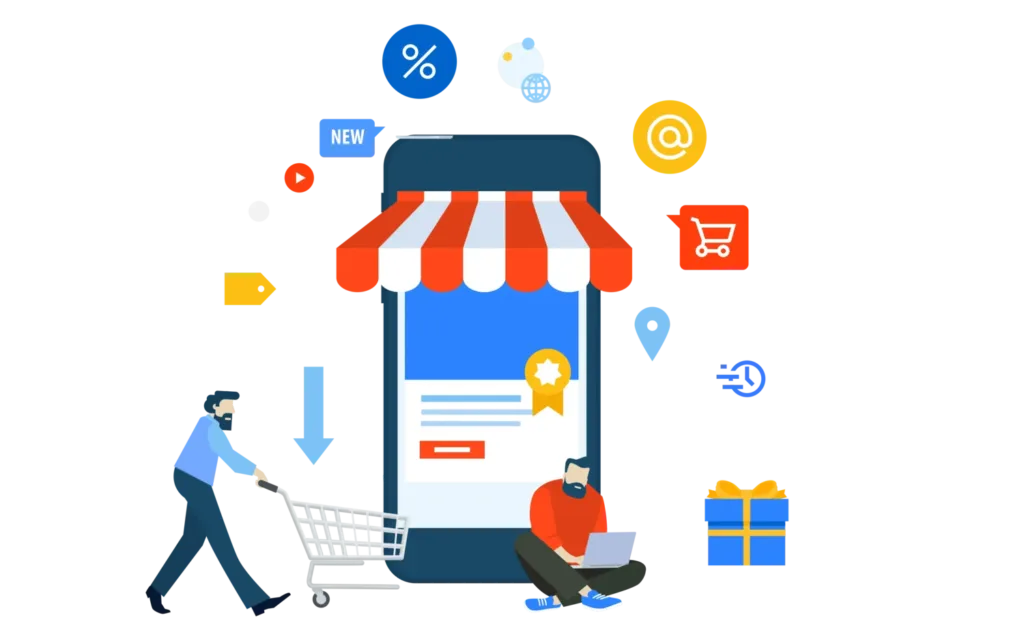
Introduction
The world has changed! The new digital devices have become more popular, the Internet has expanded in all segments of society, and as a result e-commerce field has emerged and become a market of its own.
The digital era founded the need to have an electronic way for trading. With the advent of sites like Facebook & Twitter, both sellers & buyers found an easy way to communicate. According to statista.com, the number of online buyers in 2021 is over 2.14 billion people worldwide.
Saudi Arabia as one of the developing countries, the number of online shoppers in 2022 is expected to exceed 20 million. According to CITC KSA, Saudi Arabia has generated SAR30 billion e-commerce revenue in 2016 and expected to exceed SAR82 billion by 2020.
What is e-Commerce?
e-Commerce or (electronic commerce) is a successful idea based on buying and selling goods or providing services through electronic channels on the Internet. E-commerce was used for the first time in the sixties through the exchange of electronic data on value-added networks w. The idea then grew with easy access to the Internet and the emergence of users on the Internet from the 1990s to the early 2000s. Amazon started its business as a book shipper in 1995. Then, eBay enables users to sell to each other online, the idea of online auctions started spreading in 1995.
E-Commerce Types
There are many types, but the most prominent are the four basic types of e-commerce business models:
(B2B) e-Commerce
business-to-business e-commerce model means trading or servicing at the corporate level. B2B models use online trading companies to exchange goods with each other. For example, a manufacturer sells its goods to a wholesaler who sells it to a retailer.
(B2C) e-Commerce
In the business-to-consumer e-commerce model, the company sells or provides services directly to the customer via the Internet. The e-retailer falls in the B2C model as they buy from a wholesaler in bulk, then sells goods online to individual customers. For example, Amazon sells individual goods to individual customers.
(C2B) e-Commerce
Consumer-to-Business model allows an individual to sell goods and provide services to a company. It’s the reverse path of the B2C model. A good example for this model is freelancer.com where the business can buy a service from individuals.
(C2C) e-Commerce
Consumer-to-Consumer business model allows the customer to sell goods or provide services to other customers with the help of the Internet, and this is called mobile e-commerce! eBay & OLX are a great example of a successful C2C e-commerce model.
E-Commerce Platforms
The e-commerce platform allows companies to create online stores. In these stores, companies can sell products or provide services to people all over the world, using delivery services to ship their products to customers overseas. Here are a list of top used e-commerce platforms todays:








How to Start an Ecommerce Business?
- Research and Prepare: You cannot start e-commerce without proper research and preparation. Providing this information helps to understand all the problems related to the project to start with.
- Develop a Business Plan: The business plan will help you define your ideas and goals. This will save you a lot of time and money in the long run. It will prepare you to face the challenges and opportunities that you will face upon startup.
- Research Competition: It is important for entrepreneurs to look for competitors. They are useful for identifying competitors ’weaknesses, helping to invent new ideas and keywords, and for analyzing strategies. Read more about competitors price comparison tools.
- Finding the Right Vendors: A success factor for e-commerce business is finding the right suppliers for your business.
- Setting up an Ecommerce Store: These are some of the basics that you need to take care of such as name and logo before creating your online store, choosing sales channels, safe domain, payment gateway, and hosting.
- Install Analytics & tracking tools: Analytics can give companies a competitive advantage in the competitive marketplace. Read more about Google Analytics for e-Commerce
How to increase your e-commerce sales?
SEO for e-commerce:
It is the free advertising method for your business in search engines. SEO will allow you to have a strong presence on the internet so customers easily reach you. Read more about Search Engine Optimization.
Promote Your Products:
Shopping for your products should have your own marketing strategies and a process that helps you win customers and their loyalty.
A good marketing strategy will help spread your brand, but a wonderful marketing strategy makes the customer feel smart in choosing your product. When this happens, you get more sales and more confidence from your customers! Read more about Digital Marketing Strategies.
Content Marketing:
Content is king! you should consider content marketing in the world of e-commerce. Creating useful, relevant, consistent, and engaging content that attracts and maintains your target audience – and ultimately, in order to provide a satisfying business to customers. Read more about Content marketing Strategy.
Email Marketing:
According to the latest research studies, email marketing effectively helps to drive sales and profits. It is also used to keep customers and update their information about your product. So, It’s a good idea to utlize email to announce new products, remind people to renew their subscription or cross sell previous orders.
Driving Social Traffic:
Social media enables your business to reach the public around the world. So, utilize social media to engage with your customers, and hear their voice.
Conversions Optimization:
Understanding user behavior is essential for optimizing the conversion rate. You must know what’s going on the website?, what people liked and what not? at which stage they struggled? Google Analytics enables you to track user behaviour and optimize the conversion funnel. Such tracking tools provide a robust performance measurement for your business. It helps decision-makers to be informed and become more data-driven. Read more about Google Analytics & CRO.
E-commerce law
It is important to have a basic understanding of e-commerce law. Online sellers face various legal and financial considerations, especially with regard to privacy, security, copyrights, and taxes. The Federal Trade Commission organizes most e-commerce activities, including the use of commercial email messages, online advertisements, and consumer privacy. Companies collect and maintain sensitive personal information about their customers, and your company is subject to federal privacy laws and state laws, depending on the type of data they collect.
The future in Saudi Arabia is “e-Commerce”
e-commerce facilitates buying the products you like, so the buyer saves a lot of time and money.
On the other hand, when hard days comes (i.e. COVID-19 pandemic), only e-commerce survives! Indeed nowadays is the golden-era of e-commerce.
Never think twice, if you haven’t moved online yet, you must adopt the technology NOW. Otherwise other movers will kick you out of the game!
Send Us A Message
Quick Contact
Quick Contact
Trusted by some of the biggest companies in the Kingdom







